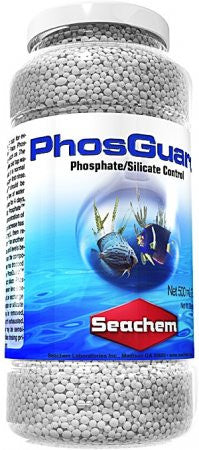SeaChem
Seachem PhosGuard
Seachem PhosGuard
Couldn't load pickup availability

Detailed information about PhosGuard can be found Here
PhosGuard™ rapidly removes phosphate and silicate from marine and freshwater aquaria. It is not recommended for phosphate buffered freshwater. PhosGuard™ is highly porous for high capacity and bead-shaped for optimum water flow. It outperforms all competing products
PhosGuard is spherical. Its shape allows for maximum water flow through the media. Granular phosphate removers can become compacted, dramatically limiting their capacity to remove phosphate. If the media can’t come into contact with the water, it can’t remove phosphate from it. PhosGuard is the only spherical phosphate remover on the market.
For best results, PhosGuard™ should be placed so as to maximize the flow of water through it. It may be used in a canister filter, box filter, or any high flow area of a trickle filter. In some situations it may be necessary to use in a filter bag. Use 250 mL (~1 cup) for every 300 L (75 gallons*). Leave product in place for 4 days, then test phosphate or silicate concentrations with either MultiTest: Phosphate™ or MultiTest: Silicate™. If the concentration of the component you are trying to decrease has not dropped to around 0.02 mg/L, then replace the PhosGuard™, otherwise leave in place until levels begin to climb again. As long as concentrations remain under control, the product is not exhausted. Each 500 mL of PhosGuard™ treats over 600 L (150 gallons*) (i.e. will remove up to 30 mg/L phosphate in 600 L (150 gallons*) of water, depending on the initial phosphate/silicate concentrations and the current biological load. Over treating is not recommended. PhosGuard™ is not an exchange resin, it does not release anything into the water. It does not leach phosphate or silicate back into the water and may be removed, dried, and returned to service until exhausted. Continuous use of small quantities is better than intermittent use of larger quantities.
Share


